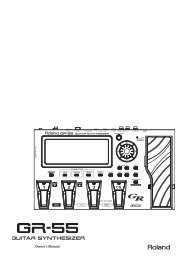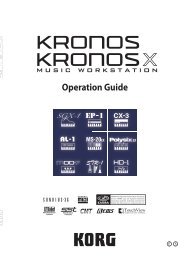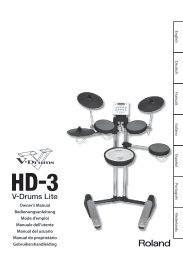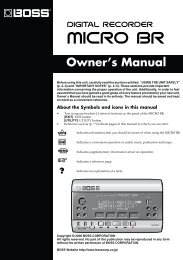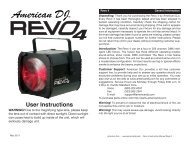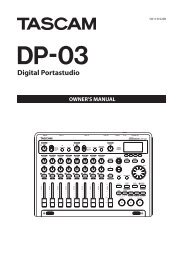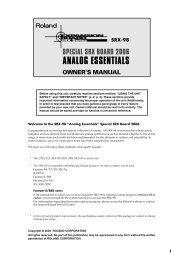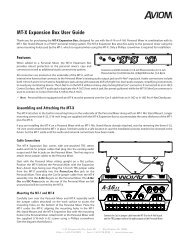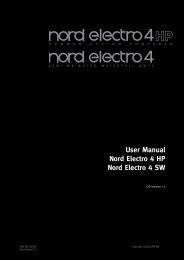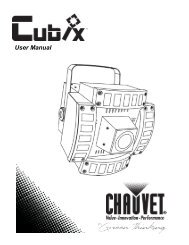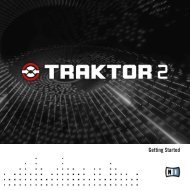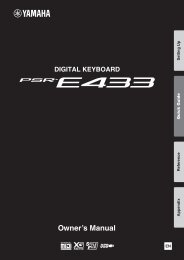Utilisation du dMIX-600 - UniqueSquared.com
Utilisation du dMIX-600 - UniqueSquared.com
Utilisation du dMIX-600 - UniqueSquared.com
You also want an ePaper? Increase the reach of your titles
YUMPU automatically turns print PDFs into web optimized ePapers that Google loves.
Operational Notes<br />
Compatability & Re<strong>com</strong>mended Peripherals<br />
A Word About Compatability<br />
The DMIX-<strong>600</strong> (and all Cortex pro<strong>du</strong>cts) are designed to interface with<br />
all driverless USB devices. This means that if the pro<strong>du</strong>ct does not<br />
require proprietary driver software and can be accessed natively by a<br />
PC or Macintosh <strong>com</strong>puter, it should be <strong>com</strong>patible with the Cortex.<br />
Note that just because the pro<strong>du</strong>ct works on a <strong>com</strong>puter without using an<br />
included driver disk, that does not mean that it is truly driverless.<br />
In theory (but sometimes not in practice), any device that doesn’t require<br />
a driver should work just fine with the Cortex. However, varying specifications<br />
of certain pro<strong>du</strong>cts (primarily USB flash memory) sometimes might<br />
present an in<strong>com</strong>patability issue. As one might imagine, testing every<br />
USB peripheral on the market would be a lifelong quest, and the intro<strong>du</strong>ction<br />
of new peripherals on the daily basis would make it even more<br />
difficult.<br />
If you are having trouble with a specific peripheral, please find the <strong>com</strong>patability<br />
advisory section of our website, and let us know! In the vast<br />
majority of cases, support can be added for sub-standard units that<br />
deviate from typical specifications.<br />
• DAE capability for Audio CD playback via CD-ROM/DVD-ROM drive<br />
In order to play back audio CDs on a CD-ROM/DVD-ROM drive, the<br />
drive itself must support bit-accurate Digital Audio Extraction (DAE for<br />
short). If the drive does not support bit-accurate DAE, it is possible that<br />
you may notice anomolies such as pops & clicks <strong>du</strong>ring playback.<br />
• USB Hubs must be Powered, not Passive (non-powered)<br />
Although the Cortex is able to provide power to the vast majority of<br />
USB-powered devices, USB Hubs should be powered. Although a passive<br />
hub itself will function, the extraneous current draw of the devices<br />
connected to it may cause instability when operating the Cortex.<br />
• Write-protection must be Disabled (where applicable)<br />
When using a writeable device (hard drive, music player, flash memory),<br />
any write-protection must be disabled. Otherwise the Cortex will not be<br />
able to store the database it has created.<br />
Certified-Compatible Devices<br />
For a list of devices that have been tested and are certified to be <strong>com</strong>patible<br />
with the DMIX-<strong>600</strong>, please visit the support section of our website<br />
at http://www.cortex-pro.<strong>com</strong><br />
Device Requirements<br />
• USB Compliance<br />
The storage device must <strong>com</strong>ply to USB 1.0, 1.1, or 2.0 specifications.<br />
Wireless USB devices are not supported.<br />
• Devices should be dedicated for use with the Cortex, if possible<br />
For optimal performance, the storage devices you use should be decicated<br />
for audio-only use. No other files should be stored on the device,<br />
other than the audio and database files used by the Cortex.<br />
• Drives must be unpartitioned<br />
The DMIX-<strong>600</strong> cannot switch between multiple partitions - it recognizes<br />
the first partition on the active device. This is crucial for the efficiency of<br />
the database driven search.<br />
• FAT32, NTFS, or HFS+ File System for Flash Memory and Hard Drives<br />
All storage devices must be formatted using FAT32, NTFS, or HFS+ file<br />
systems. On Windows PCs, all hard drives will use FAT32 or NTFS file<br />
systems, with NTFS <strong>com</strong>mon for Windows XP and later. HFS+ is the file<br />
system that is used by Macintosh and Linux-based machines.<br />
• NTFS is read-only!<br />
If you are using an external hard drive that is formatted using the NTFS<br />
file system, you will not be able to create a database using the DMIX-<br />
<strong>600</strong> unit. Instead, you should use the Cortex Database Creation (DBC)<br />
software for PC or Mac. This should not impact the majority of users, as<br />
the only devices that will be typically formatted using NTFS are extremely<br />
large hard drives over 32 gigs. When there is a large music collection,<br />
using the DBC software will be dramatically faster at creating a database.<br />
5



